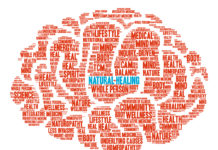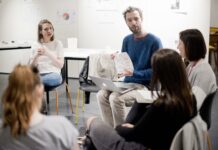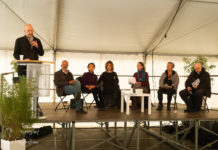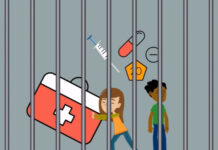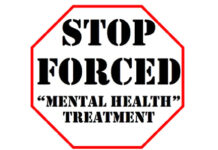Comments by Shock Survivors and Their Loved Ones
The #FDAStopTheShockDevice petition has received over 2,200 signatures and 800+ comments. A more thorough analysis of those comments is forthcoming, however, we wanted to offer a glimpse of what people shared. The sixth, seventh, and eighth most common words used in the comments submitted through the petition were "damage," "barbaric" and "torture." We must continue the fight to make sure that the FDA hears the people who will be adversely affected by the proposed rule if it becomes an order. There is still a small window of time for you to sign the petition and leave a comment to the FDA.
Intentional Peer Support: Creating Relationships, Creating Change
IPS is about creating a power-balanced, relational context in which we can begin to explore and even challenge the stories we have been taught. We can name our experiences, and challenge the meaning that we have constructed around those experiences. This fundamentally alters what we think of as “help,” but also challenges social and political constructs of disability.
Reimagining Healthcare
The conventional Western classification systems of health conditions are based on flawed science shaped by reductionist, hierarchical, and profit-driven ideologies. THEN wants to create a new paradigm built upon principles drawn from systems science, the life course perspective, developmental neurobiology, and other evidence-informed studies.
Prescripticide: A Proposal for Action and a Request for Your Help
The primary factor protecting psychiatry’s unwarranted power and authority is that it is perceived as shielding society from folks who are believed to be dangerous. It would seem, then, that one logical step toward reducing society’s trust in biological psychiatry would be to reveal the evidence of a significant correlation between the use of prescribed psychoactive drugs and the commission of violent acts against oneself or others.
Victim Blaming: Childhood Trauma, Mental Illness & Diagnostic Distractions?
Why, despite the fact that the vast majority of people diagnosed with a mental illness have suffered from some form of childhood trauma, is it still so difficult to talk about? Why, despite the enormous amount of research about the impact of trauma on the brain and subsequent effect on behaviour, does there seem to be such an extraordinary refusal for the implication of this research to change attitudes towards those who are mentally ill? Why, when our program and others like it have shown people can heal from the effects of trauma, are so many people left with the self-blame and the feeling they will never get better that my colleague writes about below?
Making Peer Counseling Radically Accessible
I imagined a world in which anyone can hit a button on their phone and be connected with a compassionate and empathetic listener, 24/7. So in 2019, I founded Peer Collective. Today, there are 30 peer counselors on the platform offering 30-minute counseling sessions for just $14.
Will the European Elections Be a Chance for Mental Health?
European citizens from 27 different countries will soon go to the polls to elect their representatives in the European Parliament for the next five years. As an advocacy organisation, we see those elections as an opportunity to call on current and future European leaders and policymakers to bring mental health to the heart of European policies.
Study Finds Hearing Voices Groups Improve Social and Emotional Wellbeing
Hearing Voices Network self-help groups are an important resource for coping with voice hearing, study finds.
2017: A Wake-up Call on Mental Health and Human Rights
At Mental Health Europe, we see 2017 as having been a crossroads for mental health and human rights. Let’s ensure that this yields concrete change in 2018 with the support of like-minded communities ready to take the discussion to the next level and truly enact this as a civil rights movement.
Berlin Manifesto for Humane Psychiatry Released
Changing the mental health and psychosocial support system in Germany requires public debate about the ways our society should help and support people in mental crisis and with chronic mental health problems. We believe the driving force behind all help and support should be humanitarianism and respect for inalienable human rights.
Psychosocial Disability and Legal Capacity: Don’t Bargain with Human Rights
For persons with psychosocial disabilities, one of the most fundamental rights laid out in the CRPD is the right to equal recognition before the law and legal capacity (Article 12). Our latest Position Paper focuses on Article 12 of the CRPD.
CHOICES Back on Track
Last year I reported that CHOICES, Inc. had lost its way and was implementing an ACT team. There is no doubt in my mind that CHOICES was on the wrong path, but the new Executive Director is committed to getting CHOICES back to a peer-run program.
Disobedience: What Can We Risk?
It is possible to heal, and at the same time healing also means restoring the part of oneself that can face violence and disobey to protect what is most sacred. I am that sacred, and so are you.
Open Dialogue Approach Reduces Future Need for Mental Health Services
The Open Dialogue psychiatric treatment approach is associated with reduced utilization of mental and general health services for Danish youth.
And They Said it Wouldn’t Last – Rethinking Psychiatry Celebrates its 7th Year
Rethinking Psychiatry is proud to continue the work that began in 2010 in Portland, and we look forward to many more years of challenging the dominant paradigm in mental health and providing new perspectives and solutions.
CRPD Absolute Prohibition Campaign and Course
For a long time I have been interested in offering a course on CRPD (Convention on the Rights of Persons with Disabilities) to pass on my knowledge to other activists and allow more people to take up the frustrating and passionate responsibility of human rights work. Finally I have come up with a plan that is doable.
Lessons from Soteria-Alaska
Yes, Soteria-Alaska is closing. And its sister organization, CHOICES, Inc., has lost its way. As the person who conceived of both of these and got them going, I have some thoughts that might be worthwhile about what went wrong; what should or might have been done differently; and most importantly, what lessons might have been learned.
Electroshocking Veterans and Their Fetuses
I have long been concerned with the way society responds to people who come back from war. Veterans are routinely funneled into psychiatry’s grasp. Over the decades, some people who fought in wars have shared with me their experiences of being psychiatrized upon return from war. Sometimes these experiences included veterans being stripped of their second amendment rights, and a host of other constitutional, civil, and human rights violations as they began to be forced into complying with psychiatric regimens, and on several occasions this included veterans being subjected to electroshock.
“All for the Best of the Patient”
For psychiatric ‘help’ to happen by force is a paradox and makes absolutely no sense. It can destroy people's personality and self-confidence. It can lead, in the long run, to physical and psychological disability. My dear daughter Luise got caught in this ‘helping system’ by mistake, but she didn't make it out alive. I'm sad to say I later discovered that the way Luise was treated was more the rule than the exception.
The CHRUSP Call to Action, and Its Significance
Various instruments of the United Nations have commented on forced treatment, or involuntary confinement, or both (for details, see Burstow, 2015a), and a number of truly critical additions to international law have materialized. Arguably, the most significant of these is the Convention on the Rights of Persons with Disabilities. What makes it so significant? For one thing, it is because this landmark convention puts forward nothing less than a total ban on both involuntary treatment and the involuntary confinement of people who have broken no laws.
ECT Day of Protest: Time for You to Take Leadership
Work on the May 16 International Day of Protest Against Shock Treatment is moving right along. This spontaneously-organized, grassroots effort now includes 21 cities in 16 states, plus two each in Canada and the United Kingdom. There will also be demonstrations in Ireland, New Zealand, and Uruguay. We CAN win, and you CAN be a leader.
Doing It Alone Together: Core Issues In Dutch Self-Managed Residential Programs
For the last six years we, a group of researchers, social work students, peer experts, and social professionals associated with the Amsterdam University for Applied Sciences, have been studying and facilitating the development of self-managed programs in homelessness and mental health care in the Netherlands. With our research we want to contribute to the development of new and existing programs through critical reflection. With this blog, I hope to share some of our findings, to give back to the respites from which we learned so much.
Medical Science Argues Against Forced Treatment Too
The argument that is usually made against involuntary commitment and forced treatment is that these actions, under the authority of a state, violate a person’s basic civil rights. They deprive a person of liberty and personal autonomy, and do so in the absence of a criminal charge. However, there is another argument, one of adjunctive value, that can be made against involuntary commitment and forced treatment. Medical science argues against forced treatment too.
Carina Håkansson: Family Care Foundation
Carina Håkansson, co-founder of the Family Care Foundation in Sweden, discusses her work with family care homes, psychotherapy and family therapy absent from psychiatric diagnoses and manuals.
Bipolarized and Crimes Against Nature
Rethinking Psychiatry recently hosted a showing of the award-winning film 'Bipolarized.' The film criticizes both the mainstream mental health system and societal standards of masculinity. The author of this post draws parallels to the film and the one-man show "Crimes Against Nature," in which psychology professor Dr. Chris Kilmartin critiques traditional standards of masculinity as harmful and unrealistic.



